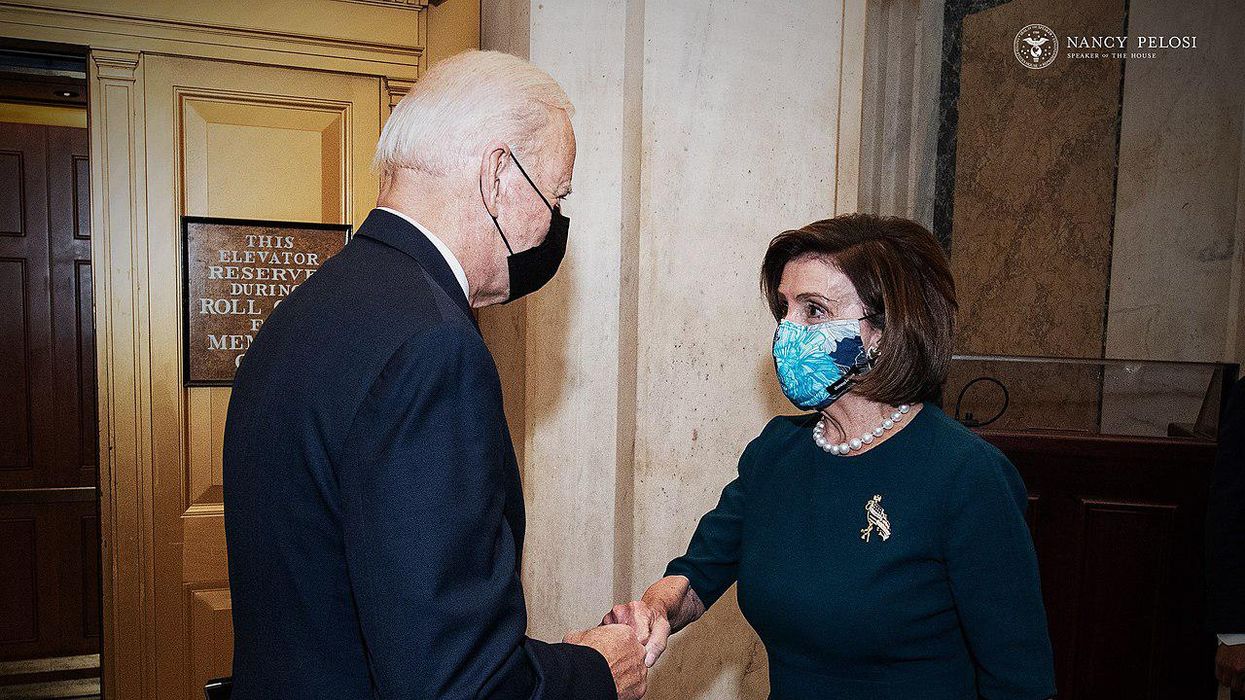'Stumble into the abyss': Legal scholars warn the US may face a dire 'constitutional crisis' in Jan. 2025

President Joe Biden and House Speaker Nancy Pelosi on October 28, 2021, Wikimedia Commons
February 01, 2022 | 01:06PM ETBank
During a recent appearance on CNN, “Real Time” host Bill Maher — in a dead-serious tone — warned that if the United States faces a full-blown constitutional crisis following the 2024 presidential election and all hell breaks loose in the streets in January 2025, it would be a good time to be in London. And Maher is hardly the only one who fears that January 2025 could be much worse than January 2021. Two legal scholars, Yale University’s Bruce Ackerman and Indiana University’s Gerard Magliocca, warn that the next Joe Biden/Donald Trump showdown could be followed by a devastating constitutional crisis for the United States — one that would make even the horrors of January 2021 pale in comparison.
In an article published by Politico on February 1, Ackerman and Magliocca explain, “Donald Trump is already signaling that he will run for president in 2024. A Biden-Trump rematch risks worsening our country’s already deep divisions. But there’s more to be worried about: The next election will provoke a genuine constitutional crisis, unless decisive steps are taken soon to prevent it.”
Without rapid and decisive action, the contest between Biden and Trump will catalyze a shattering constitutional crisis. https://www.politico.com/news/magazine/2022/02/01/biden-trump-constitutional-crisis-00003959\u00a0\u2026— Bruce Ackerman (@Bruce Ackerman) 1643724188
The chilling 2024 election/January 2025 scenario that Maher outlined on CNN was:
Trump runs for president again in 2024 and loses to President Joe Biden or another Democrat in the general election, Trump refuses to concede or admit that he lost, and both Trump and the Democratic winner show up on January 20, 2025 for Inauguration Day. Maher told CNN, “What happens on January 20, 2025 when he shows up for the inauguration and Joe Biden, or whoever the Democrat is, shows up for that inauguration? What happens then? That's when I want to be, you know, on vacation in London.”
Ackerman and Magliocca are no less worried about what lies ahead in 2024 and 2025. Some Democrats, they observe, are talking about possibly using Section 3 of the 14th Amendment of the U.S. Constitution against Trump: the Disqualification Clause, which prohibits anyone who “engaged in insurrection” from holding office. But state governments, according to Ackerman and Magliocca, are bound to have very different views on whether or not Trump has “engaged in insurrection.”
“Some election authorities will disqualify him, while others will conclude that the facts are insufficiently compelling to justify his exclusion under the 14th Amendment,” Ackerman and Magliocca argue. “This means that in 2023, the nation will be split into two parts. In the ‘constitutionalist’ region, Trump will be disqualified. In the ‘insurrectionist’ region, the electoral authorities will validate him as a legitimate candidate for the Republican nomination.”
The law professors continue, “You can imagine the scene: For the rest of the campaign season, Trump will organize massive rallies in the insurrectionist states while the democratic opposition in these states will respond with counterdemonstrations. Violent confrontations may well result. At the same time, Democrats will mobilize against Trump in the constitutionalist states, and Republicans will passionately defend him.”
Growing recognition of Fourteenth Amendment as the pathway enabling the Dems to disqualify Trump as a presidential candidate and enable Biden to focus the energies of Congress and the nation on effective solutions to the COVID crisis.https://www.bostonglobe.com/2021/01/14/opinion/14th-amendment-offers-an-easier-way-than-impeachment-ban-trump-future-office/\u00a0\u2026— Bruce Ackerman (@Bruce Ackerman) 1610721823
Ackerman and Magliocca go on to warn that in 2024, such a “constitutional crisis will escalate further once the polls close and each state decides who won the election.”
“Under the Constitution,” Ackerman and Magliocca write, “the states send their Electoral College reports directly to the vice president. Once she receives them, Kamala Harris will preside over a joint session of Congress on January 6, 2025 — the fourth anniversary of the insurrection — to count the votes. Once she inspects the ballots, she is likely to find that none of the leading candidates — neither Biden nor Trump nor Trump’s proxy — has won a majority of the electoral votes. At that point, she will confront little-known provisions of the Constitution that will make Mike Pence’s predicament on January 6, 2021 seem modest by comparison.”
My dark prediction for the 2024 U.S. presidential election.pic.twitter.com/GxHDEVh5dN— Bill Maher (@Bill Maher) 1633755339
Ackerman and Magliocca wrap up their article by hoping that the U.S. Supreme Court will offer a “broad-ranging opinion defining the standards that apply to Trump” under the 14th Amendment and the Disqualification Clause.
“Justice Neil Gorsuch authored an opinion in 2012 that explicitly upheld a state’s ‘legitimate interest’ in excluding presidential primary ‘candidates who are constitutionally prohibited from assuming office,’” Ackerman and Magliocca write. “Will he and his fellow conservatives redeem their own commitment to the Framers of the 14th Amendment by taking a case onto their docket that makes it clear that Trump cannot put himself above the Constitution? Or will the Court pretend that nothing extraordinary is happening and allow the country to stumble into the abyss?”